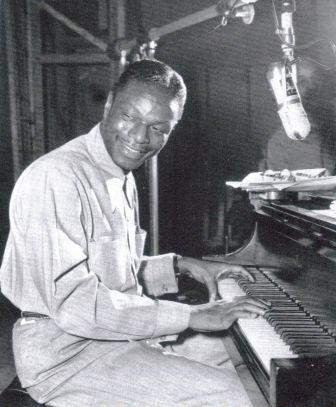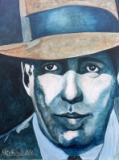Harlem Renaissance
In the early 1920's there was a movement called the "Negro" or "Harlem Renaissance". This resurgence of literature, knowledge, and the arts coming out of New York was powerful.

Nat King Cole was an African American musician who first came to prominence as a leading jazz pianist. Although an accomplished pianist, he owes most of his popular musical fame to his soft baritone voice, which he used to perform in big band and jazz genres. He was one of the first black Americans to host a television variety show, and has maintained worldwide popularity since his untimely death; he is widely considered one of the most important musical personalities in United States history.
Born Nathaniel Adams Coles on March 17, 1919 in Montgomery, Alabama, Cole was born into a family with a pivotal position in the black community. Nat's father was the Reverend Edward James Coles Sr. His mother's name was Perlina Adams Coles. Together they had thirteen children, but only five of them lived to adulthood. Nat's father was pastor of the First Baptist Church. In 1921, the family migrated to Chicago, part of the mass exodus seeking a better life in the prospering industrial towns of the north. Nat's mother knew that her children would go to public schools with facilities rarely enjoyed by negroes in the south.
At four years old, Nat King Cole was learning the piano by ear from his mother, a choir director in the church. His first public performance was at the age of four and when he was in Kindergarten he played for the other children. Nat regularly played in his father's church from the age of 11 and was an accomplished pianist by the age of 12. He left school at 15 to pursue a career as a jazz pianist. Cole’s first professional break came touring in the revival of the show “Shuffle Along.” When the show folded he was stranded in Los Angeles. Cole looked for club work and found it at the Century Club on Santa Monica Boulevard, where he made quite an impression with the “in” crowd.
In 1939, Cole formed a trio with Oscar Moore on guitar and Wesley Prince on bass, notably they had no drummer. Gradually Cole would emerge as a singer. The group displayed a finesse and sophistication which expressed the new aspirations of the black community. In 1943, he recorded “Straighten Up And Fly Right,” for Capitol Records, inspired by one of his father’s sermons. It was an instant hit, assuring Cole’s future as a pop sensation. With the addition of strings in 1946 “The Christmas Song” began Cole’s evolution into a sentimental singer. In the 1940s he made several memorable sides with the Trio, including “It’s Only A Paper Moon” and “(I Love You) For Sentimental Reasons.” But by 1948, and “Nature Boy,” the move away from small-group jazz, towards his eventual position as one of the most popular vocalists of the day, was underway.
In October 1956, Nat started his own TV show. Cole's popularity allowed him to become the first African American to host a network variety program, The Nat King Cole Show, which debuted on NBC television in 1956. The show fell victim to the bigotry of the times, however, and was canceled after one season; few sponsors were willing to be associated with a black entertainer.
Cole had greater success with concert performances during the late 1950s and early '60s and twice toured with his own vaudeville-style reviews, The Merry World of Nat King Cole (1961) and Sights and Sounds (1963). His hits of the early '60s—“Ramblin' Rose,” “Those Lazy, Hazy, Crazy Days of Summer,” and “L-O-V-E”—indicate that he was moving even farther away from his jazz roots and concentrating almost exclusively on mainstream pop. Adapting his style, however, was one factor that kept Cole popular up to his early death from lung cancer in 1965.
In January 1964, Cole made one of his final television appearances on The Jack Benny Program. In his typically magnanimous fashion, Benny allowed his guest star to steal the show. Cole sang “When I Fall in Love” in perhaps his finest and most memorable performance. Cole was introduced as “the best friend a song ever had” and traded very humorous banter with Benny. Cole highlighted a classic Benny skit in which Benny is upstaged by an emergency stand-in drummer. Introduced as Cole’s cousin, five-year-old James Bradley Jr. stunned Benny with incredible drumming talent and participated with Cole in playful banter at Benny’s expense. It would prove to be one of Cole's last performances.
Cole fought racism all his life and refused to perform in segregated venues. In 1948, Cole purchased a house in the all-white Hancock Park neighborhood of Los Angeles. The Ku Klux Klan, still active in Los Angeles well into the 1950s, responded by placing a burning cross on his front lawn. Members of the property-owners association told Cole they did not want any undesirables moving in. Cole retorted, "Neither do I. And if I see anybody undesirable coming in here, I'll be the first to complain."
In 1956, Nat King Cole was assaulted on stage during a concert in Birmingham, Alabama, while singing the song "Little Girl", by three members of the North Alabama White Citizens Council. The attacking group was led by Education of Little Tree author Asa "Forrest" Carter, although he was not among the attackers. They were apparently attempting to kidnap him. The three male attackers ran down the aisles of the auditorium towards Cole and his band. Although local law enforcement quickly ended the invasion of the stage, the ensuing melee toppled Cole from his piano bench and injured his back. Cole did not finish the concert and never again performed in the South. A fourth member of the group who had participated in the plot was later arrested in connection with the act. All were later tried and convicted for their roles in the crime.
Don't miss a single page. Find everything you need on our complete sitemap directory.
Listen or read the top speeches from African Americans. Read more
Read about the great African Americans who fought in wars. Read more
African Americans invented many of the things we use today. Read more
Thin jazz, think art, think of great actors and find them here. Read more
Follow the history of Black Americans from slave ships to the presidency. Read more
Olympic winners, MVPS of every sport, and people who broke the color barrier. Read more
These men and women risked and sometimes lost their life to fight for the cause. Read more
Meet the people who worked to change the system from the inside. Read more

Visit my RedBubble page and use Michael Arnold Art to create greeting cards, T-shirts, mugs, and more.

The variety and impressive numbers of mammals, birds and marine wildlife in Alaska draw visitors from all over the world. For some travelers, Alaska is wilderness, at least compared to what they may know from back home. The pristine wilderness of Alaska is, perhaps, the last vestige of thriving populations of North American wildlife. Where else can you see polar bears, bald eagles, blue and humpbacked whales, gray wolves, grizzly bears, orcas, lynx, moose, and hundreds of other rare and endangered species in their original and undisturbed natural habitats?

Enjoy our website filled with original signed acrylic paintings by award winning Artist Michael Arnold. Located in Citrus County Florida, Michael Arnold is a the editor at the Citrus County Chronicle. When he's not busy being an editor, he is an avid artist who enjoys painting in a variety of styles. We hope you take the time to click on each image to see a larger view and to learn what the artist, Michael Arnold has to say about his paintings.

As dog owners and people who care deeply for animals and wildlife, we wanted our Dog Encyclopedia to be a website that could empower pet owners to create the most positive, loving environment for their dogs. Dog Encyclopedia realizes that owning a dog is like adding a new member to your family.

Floridian Nature has everything your are looking for in Florida nature. The wildlife of Florida is rich and varied, yet most of us are familiar with only a dozen or so species: the "well known endangered species such as manatees and panthers; those, like raccoons and squirrels, that have adapted to urban environments; the frightening alligators and black bears; and those like the armadillo who can't seem to cross the road. Yet they are just a few of the many animal species found in Florida.
